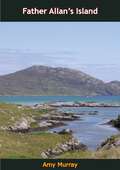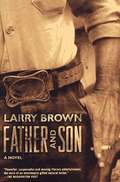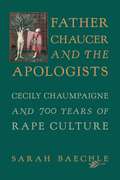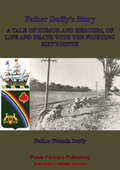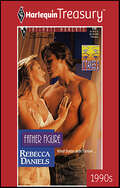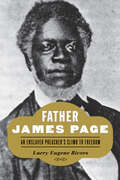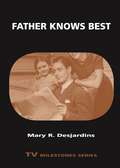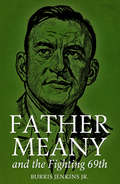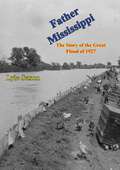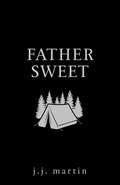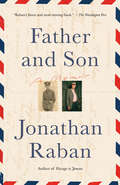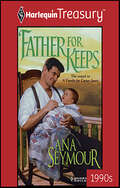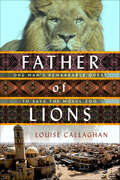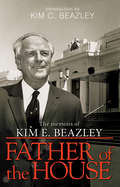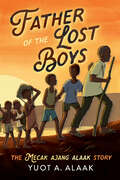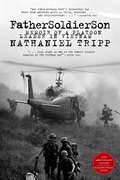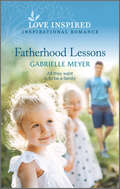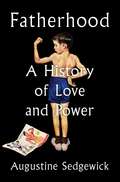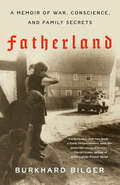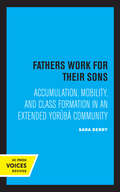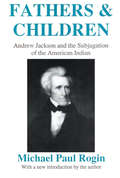- Table View
- List View
Father Allan's Island
by Amy MurrayFather Allan's Island, by Amy Murray, with a foreword by Padraic Colum is the story of her visit to the island of Eriskay in the Outer Hebrides, where she went to collect folk melodies and stayed "from a Lady Day to a St. Michael's." In some ways the volume is reminiscent of The Aran Islands of J. M. Synge, but Miss Murray's journey was more of an adventure and less of an introspection. Her style is a mixture of Elizabethan and Hebridean colloquialisms which at first seems mannered and almost unintelligible, but which grows in vigour and effectiveness as the volume progresses. - The Dial, Volume 71 [1921]In Father Allan's Island Miss Amy Murray presents with charm and insight the wonder tales, the simple faith, the folk music, and the color of the daily lives of the inhabitants of the tiny isle of Eriskay. The book incorporates some thirty representative folk-songs with music. Padraic Colum, in a foreword, praises especially the author's dramatic style. - Fortnightly Review." Volume 28, Issue 4 [1921]
Father And Son
by Larry BrownThis classic story of good and evil takes place in the rural American South of 1968. After being released from prison, Glen Davis returns to his hometown only to commit double homicide within forty-eight hours of his return. Sheriff Bobby Blanchard, as upright as Glen is despicable, walks in the path of Glen's destruction and tries to rebuild the fragile ties of the families and community they share. Dark secrets that have been simmering for two generations explode to the surface, allowing us a chilling glimpse at how evil can fester in a man's heart and eat up his soul.
Father Chaucer and the Apologists: Cecily Chaumpaigne and 700 Years of Rape Culture
by Sarah BaechleOn May 4, 1380, Cecily Chaumpaigne filed a quitclaim with the Chancery in Westminster, releasing the poet Geoffrey Chaucer from any prosecution de raptu meo (on account of my rape). This legal document, lost for centuries, has haunted Chaucer studies since its rediscovery in 1873. Over the past 150 years since it reemerged, many Chaucer scholars have sought to discount, sanitize, or excuse the release. Through a careful examination of the long Chaucer historiography, Sarah Baechle shows how critics have read the question of Chaucer’s potential culpability for rape through prevailing attitudes toward sexual violence. They did so, moreover, in ways that will be very familiar to contemporary readers versed in rape culture—practices that dismiss sexual violence by centering and promoting accused perpetrators, erasing or attacking the victim-survivor, and minimizing the violence of the crime. Baechle pairs the necessary excavation of this critical history with reparative readings of the poet’s narratives of sexual violence, including the Miller’s Tale, the Reeve’s Tale, the Wife of Bath’s Tale, and Troilus and Criseyde, and she theorizes “assailant speech” as a counterpart to survivor speech, proposing it as a new means of understanding Chaucer’s place in feminist studies of the Middle Ages.Father Chaucer and the Apologists is an urgently needed examination of the discourse surrounding Chaumpaigne’s quitclaim that reveals the ties between Chaucer studies and the persistence of rape culture. This book will appeal to students and scholars of Chaucer and of gender and sexual violence more broadly.
Father Duffy’s Story; A Tale Of Humor And Heroism, Of Life And Death With The Fighting Sixty-Ninth [Illustrated Edition]
by Joyce Kilmer Father Francis Patrick Duffy[Includes 8 photograph illustrations]On the northern half of Times Square in the heart of New York is a square named after Father Francis Patrick Duffy, a priest whose faith in God was only matched by the attachment to his flock. He is mainly known for his legendary exploits as chaplain of the Fighting Sixty-Ninth regiment (renumbered the 165th in Federal Army List) in the First World War. The regiment, composed of mainly troops of Irish heritage, had historically been at the forefront of the Civil War fighting at Antietam, Fredericksburg, Chancellorsville and Gettysburg. When the regiment marched to battle in the First World War, the troops were also mainly of an Irish Catholic background, headed by Father Duffy, who was never content to see the men of his charge go off to the front alone and frequently went into the maelstrom of battle as a stretcher bearer. Duffy and his regiment fought at Lunéville enduring a gas attack, before engaging at the Battle of the Ourcq and taking part in the two major American offensives at St. Mihiel and in the Argonne.Perhaps no finer compliment to him was paid by the regimental commander who stated that he and his actions were the key to the keeping unit's morale high. A fine memoir by a towering figure in American First World War history."Diary/memoir, June 1917--April 1919. Duffy was chaplain of the 165th Infantry, 42nd Division. An exciting account by the legendary chaplain, recounting his exploits in St. Mihiel, the Argonne, and elsewhere."- p. 120, Edward Lengel, World War I Memories, 2004, The Scarecrow Press, Lanham Maryland, Toronto, Oxford.
Father Figure (It Takes 2)
by Rebecca DanielsIT TAKES 2What Dylan didn't know...DYLAN AND MARISSA HAD A PAST....Small-town sheriff Dylan James had encountered his share of teenage troublemakers. But Josh Wakefield was different. He was Marissa Wakefield's nephew. Marissa-the woman who had broken Dylan's heart so long ago. The woman he couldn't help wanting still....BUT DID THEY HAVE A FUTURE?Marissa had hoped to see Dylan James again and feel nothing. Instead, just the opposite had happened. But they didn't stand a chance. Marissa could never tell Dylan her secret-that she wasn't Josh's aunt after all. She was his mother...and Dylan was his father.IT TAKES 2. Mallory and Marissa, twins bound by love and secrets, they find that danger and romance can strike twice.
Father James Page: An Enslaved Preacher's Climb to Freedom
by Larry Eugene RiversThis first-of-its-kind biography tells the story of Rev. James Page, who rose from slavery in the nineteenth century to become a religious and political leader among African Americans as well as an international spokesperson for the cause of racial equality.James Page spent the majority of his life enslaved—during which time he experienced the death of his free father, witnessed his mother and brother being sold on the auction block, and was forcibly moved 700 miles south from Richmond, VA, to Tallahassee, FL, by his enslaver, John Parkhill. Page would go on to become Parkhill's chief aide on his plantation and, unusually, a religious leader who was widely respected by enslaved men and women as well as by white clergy, educators, and politicians. Rare for enslaved people at the time, Page was literate—and left behind ten letters that focused on his philosophy as an enslaved preacher and, later, as a free minister, educator, politician, and social justice advocate. In Father James Page, Larry Eugene Rivers presents Page as a complex, conflicted man: neither a nonthreatening, accommodationist mouthpiece for white supremacy nor a calculating schemer fomenting rebellion. Rivers emphasizes Page's agency in pursuing a religious vocation, in seeking to exhibit "manliness" in the face of chattel slavery, and in pushing back against the overwhelming power of his enslaver. Post-emancipation, Page continued to preach and to advocate for black self-determination and independence through black land ownership, political participation, and business ownership. The church he founded—Bethel Missionary Baptist Church in Tallahassee—would go on to be a major political force not only during Reconstruction but through today. Based upon numerous archival sources and personal papers, as well as an in-depth interview of James Page and a reflection on his life by a contemporary, this deeply researched book brings to light a fascinating life filled with contradictions concerning gender, education, and the social interaction between the races. Rivers' biography of Page is an important addition, and corrective, to our understanding of black spirituality and religion, political organizing, and civic engagement.
Father Knows Best (TV Milestones Series)
by Mary R. DesjardinsAlthough the iconic television series Father Knows Best (CBS 1954-55; NBC 1955-58; CBS 1958-60) has enjoyed a long history in rerun syndication and an enduring fan base, it is often remembered as cultural shorthand for 1950s-era conformism and authoritarianism. In this study of Father Knows Best, author Mary R. Desjardins examines the program, its popularity, and its critical position within historical, industrial, and generic contexts to challenge oversimplified assumptions about the show's use of comedy and melodrama in exploring the place of family in mid-twentieth-century American society. Desjardins begins by looking at Father Knows Best within media and production contexts, including its origin on radio, its place in the history of Screen Gems telefilm production, and its roots in the backgrounds and creative philosophies of co-producer Eugene Rodney and star-producer Robert Young. She goes on to examine the social contexts for the creation and reception of the series, especially in the era's emphasis on family togetherness, shared parenting by both father and mother, and generational stages of the life cycle. Against this background, Desjardins also discusses several Father Knows Best episodes in-depth to consider their treatment of conflicts over appropriate gender roles for women. She concludes by exploring how the series' cast participated in reevaluations of the Anderson family's meaning in relation to "real families" of the fifties, through television specials, talk show appearances, magazine and book interviews, and documentaries. Blending melodrama and comedy, naturalistic acting, and stylized cinematic visuals, Father Knows Best dramatized ideological tensions in the most typical situations facing the American family. Scholars of mid-century American popular culture and film history as well as fans of the show will appreciate Desjardin's measured analysis.
Father Meany and the Fighting 69th
by Burris JenkinsFather Meany and the Fighting 69th, first published in 1944, is a moving account of U.S. Army chaplain Stephen J. Meany and his time with the 165th Infantry Regiment (the famed Fighting 69th of the New York National Guard) during their battle for Makin Island in November 1943. The night before the landing, Meany heard the confessions of the men, and at 2 a.m. he celebrated Mass. That morning, Father Meany boarded a landing craft and arrived on the beach at 8 a.m. Six hours later Meany was hit and fatally wounded by a sniper's bullet while going to the aid of a wounded soldier. Included are 20 pages of illustrations by author Burris Jenkins Jr.
Father Mississippi: The Story of the Great Flood of 1927
by Lyle SaxonA history of the river with firsthand accounts and photographs of the 1927 flood. Saxon’s description of the discovery, exploration, and settlement of the delta combined with his collection of personal accounts makes for a compelling blend of personal, political, geographical, and historical facts. The book, considered as much a documentation of the disaster as an impassioned plea for help, demonstrates just how volatile an environment the Mississippi River region was and continues to be.-Print ed.Lyle Saxon (1891-1946) ranks among Louisiana's most outstanding writers. During the 1920s and 1930s he was the central figure in the region’s literary community, and was widely known as a raconteur and bon vivant. In addition to Father Mississippi, Lafitte the Pirate, and Children of Strangers, he also wrote Fabulous New Orleans, Old Louisiana, The Friends of Joe Gilmore, and was a co-author of Gumbo Ya-Ya, with Edward Dreyer and Robert Tallant. During the Depression, he directed the state WPA Writers Project, which produced the WPA Guide to Louisiana and the WPA Guide to New Orleans.
Father Sweet
by J.J. MartinA shocking tale of secrets, guilt, and clerical child abuse. “God has made you special, but I will show you how to have an extraordinary life. Show you true love, as God intended for our kind.” It’s 1978. Blackburn Hamlet is a typical suburban village in eastern Ontario. In this vibrant Catholic community, life revolves around family and church. Then the safe comfort of both is destroyed by the arrival of a predator priest. When charismatic Father Sweet invites his new favourite altar boy on a camping trip, the boy’s parents insist he go. Trapped in the woods, the boy struggles to evade the priest’s sexual advances. But Father Sweet forces him to make an impossible choice. Twenty-five years later, he is lost, broken, and angry. His father’s death reveals secrets that spur the man to relive his own past. Desiring justice, in need of healing, he discovers, in a daring rescue mission, a way to achieve both.
Father and Son: A Memoir
by Jonathan RabanA NEW YORKER BEST BOOK OF THE YEAR • A poignant memoir of love, trauma, and recovery after a life-changing stroke, twinned to a powerful account of his father's experience in World War II, by a winner of the National Book Critics Circle Award.&“A beautiful, compelling memoir...Raban&’s final work is a gorgeous achievement.&” —Ian McEwan, New York Times best-selling author of Lessons In June 2011, just days before his sixty-ninth birthday, Jonathan Raban was sitting down to dinner with his daughter when he found he couldn&’t move his knife to his plate. Later that night, at the hospital, doctors confirmed what all had suspected: that he had suffered a massive hemorrhagic stroke, paralyzing the right side of his body. Once he became stable, Raban embarked on an extended stay at a rehabilitation center, where he became acquainted with, and struggled to accept, the limitations of his new body—learning again how to walk and climb stairs, attempting to bathe and dress himself, and rethinking how to write and even read.Woven into these pages is an account of a second battle, one that his own father faced in the trenches during World War II. With intimate letters that his parents exchanged at the time, Raban places the budding love of two young people within the tumultuous landscape of the war&’s various fronts, from the munition-strewn beaches of Dunkirk to blood-soaked streets of Anzio. Moving between narratives, his and theirs, Raban artfully explores the human capacity to adapt to trauma, as well as the warmth, strength, and humor that persist despite it. The result is Father and Son, a powerful story of mourning, but also one of resilience.
Father for Keeps
by Ana SeymourKATE SHERIDAN HAD A SECRETOne that gurgled and cooed so sweetly, she could never doubt her baby was a God-given gift. Trouble was, the baby's father, Sean Flaherty, hadn't stuck around long enough to know it. Now he was back and still too charming for his-and her-own good...!Kate couldn't turn her back on the father of her child. But, even more important, Sean Flaherty prayed she wouldn't want to, for their long separation had only made him realize that in Kate Sheridan-and the tiny miracle of their daughter-he'd finally found his heart's desire.
Father of Lions: One Man's Remarkable Quest to Save the Mosul Zoo
by Louise CallaghanFather of Lions is the powerful true story of the evacuation of the Mosul Zoo, featuring Abu Laith the zookeeper, Simba the lion cub, Lula the bear, and countless others, faithfully depicted by acclaimed, award-winning journalist Louise Callaghan in her trade publishing debut.Combining a true-to-life narrative of humanity in the wake of war with the heartstring-tugging account of rescued animals, Father of Lions will appeal to audiences of bestsellers like The Zookeeper’s Wife and The Bookseller of Kabul as well as fans of true animal stories such as A Streetcat Named Bob, Marley and Me, and Finding Atticus.“An unexpectedly funny and moving book. ... Through the story of a man who loves both lions and life, Louise Callaghan shows how humour and defiance can counter cruelty, and why both humans and animals crave freedom.” -- Lindsey Hilsum, International Editor, Channel 4 News and author of In Extremis: the life of war correspondent Marie Colvin.At the Publisher's request, this title is being sold without Digital Rights Management Software (DRM) applied.
Father of the House
by Kim BeazleyGet the inside story of one of Australia's longest serving and most influential Ministers in Federal Parliament. Kim E Beazley threw off the shackles of a poor childhood to become a teacher, a Union Leader and the Member for Fremantle in the Federal Parliament between 1945 and 1977. During his time in Parliament he led the reform of Australian education and played a central role in the 1963 Yirrkala Bark Petition against bauxite mining on Yolngu land— a major step forward in the struggle for Indigenous land rights. In his own words, Beazley gives us a behind-the-scenes look at the corridors of power displaying the quiet determination and drive that led to his rise to Minister for Education under Whitlam. Beazley died in October 2007 and his son, Kim Beazley Junior, provides the books introduction with special insight into the man as father and Parliamentarian.
Father of the Lost Boys for Younger Readers
by Yuot A. AlaakOnce, there was a man who rescued 20,000 boys from almost certain death. That man was my father. One of those boys was me. This is our story.During the Second Sudanese Civil War, thousands of boys were displaced or orphaned. In 1989, Mecak Ajang Alaak led the Lost Boys on a four-year journey from Ethiopia to Sudan to protect them from becoming child soldiers. This is the abridged account of that extraordinary true story.
Father ten Boom: God's Man
by Corrie Ten BoomDescribes the faith of Corrie ten Boom's father, Casper ten Boom. Accounts of Casper and his children and grandchildren are given, along with accounts of his interactions with the community in which he lived.
Father, Soldier, Son: Memoir of a Platoon Leader In Vietnam
by Nathaniel Tripp"Father, Soldier, Son will stand as one of the finest soldier memoirs of the Vietnam War . . . If all that has been written about the war in Vietnam, in fiction and nonfiction, has made it a familiar story to some, Tripp overcomes cliché by individualizing every well-known fact." -- The Boston GlobeNATHANIEL TRIPP GREW UP fatherless in a house full of women and he arrived in Vietnam as a just-promoted second lieutenant in the summer of 1968 with no memory of a man's example to guide and sustain him. The father missing from Tripp's life had gone off to war as well, in the Navy in World War II, but the terrors were too much for him, he disgraced himself, and after the war ended he could not bring himself to return to his wife and young son. In "some of the best prose this side of Tim O'Brien or Tobias Wolff" (Military History Quarterly), Tripp tells of how he learned as a platoon leader to become something of a father to the men in his care, how he came to understand the strange trajectory of his own mentally unbalanced father's life, and how the lessons he learned under fire helped him in the raising of his own sons."Not since Michael Herr's Dispatches has there been anything quite as vivid, gripping and soul-searing," raved the Washington Post, and the Chicago Tribune said "the description of combat in the jungles of Vietnam are authentic and terrifying, as good as any I have read in fact or fiction."
Father, Son, and Company: My Life at IBM and Beyond
by Thomas J. Watson Jr. Peter PetreAlong with the story of a father and son, this is IBM's story too. It chronicles the management insights that shaped its course and its unique corporate culture, the style that made Thomas Watson Sr. one of America's most charismatic bosses, and the daring decisions by Thomas Watson Jr. that transformed IBM into the world's largest computing company. One of the greatest business-success stories of all time, "Father, Son & Co." is a moving lesson for fathers who dream for their children, as well as a testament to American ingenuity and values, told in a disarmingly frank and eloquent voice.
Fatherhood Lessons
by Gabrielle MeyerTo be a good father he needs the right teacher When his twins&’ nanny leaves for a family emergency, single dad Knox Taylor knows he&’s in over his head caring for the girls alone. But having their aunt&’s aid for the summer wasn&’t the assistance he had in mind. But Merritt Lane&’s crash course in fatherhood might just teach Knox what he desperately needs to know…and reveal she&’s the partner he didn&’t know he was missing.From Love Inspired: Uplifting stories of faith, forgiveness and hope.
Fatherhood: A History of Love and Power
by Augustine Sedgewick&“Superbly intelligent…[a] rewarding Sapiens-style big history.&” —The Times (London) A bold and original history of fatherhood, exploring its invention and transformation from the Bronze Age to the present through a collective portrait of emblematic fathers who have helped to define how the world should be ruled and what it means to be a man.Fatherhood is one of the most meaningful aspects of human culture, but we know little about when or where fatherhood first emerged, or even how or why. Despite its enigmatic beginnings, fatherhood has, for centuries, given shape to ideas about the world, defined human experiences, and provided the foundation of patriarchy. The history of fatherhood is not just the story of one of humanity&’s great values: caring for those who cannot care for themselves. And it is not merely the story of patriarchy—&“the power of fathers&”—which is arguably the oldest and most widespread form of social hierarchy and political oppression. It is the story of how these twin strands of history became so entangled that they are often indistinguishable. In Fatherhood, celebrated historian Augustine Sedgewick explains how this style of parenting emerged in the first place, why it has changed over time, and whether it will endure as we know it, despite its extraordinary costs. Told through the lives of emblematic fathers like Aristotle, Saint Augustine, Henry VIII, Thomas Jefferson, Charles Darwin, and Sigmund Freud, this is an ambitious yet intimate look at how masculinity has evolved and how men have come to hold disproportionate power by expanding and reinforcing the power of fathers in times of crisis. Sedgewick, acclaimed for his &“literary gifts and prodigious research&” (The Atlantic), takes us from the Bronze Age to the present to revolutionize our understanding of fathers and challenge the fictions that have surrounded them for centuries. Fatherhood transforms our understanding of this fundamental idea, experience, and institution, allowing us to better know our past and re-envision our common future.
Fatherland
by Robert HarrisIt is twenty years after Nazi Germany's triumphant victory in World War II and the entire country is preparing for the grand celebration of the Führer's seventy-fifth birthday, as well as the imminent peacemaking visit from President Kennedy. Meanwhile, Berlin Detective Xavier March -- a disillusioned but talented investigation of a corpse washed up on the shore of a lake. When a dead man turns out to be a high-ranking Nazi commander, the Gestapo orders March off the case immediately. Suddenly other unrelated deaths are anything but routine. Now obsessed by the case, March teams up with a beautiful, young American journalist and starts asking questions ... dangerous questions. What they uncover is a terrifying and long-concealed conspiracy of such astounding and mind-numbing terror that is it certain to spell the end of the Third Reich -- if they can live long enough to tell the world about it.
Fatherland: A Memoir of War, Conscience, and Family Secrets
by Burkhard BilgerA New Yorker staff writer investigates his grandfather, a Nazi Party Chief, in &“a finely etched memoir with the powerful sweep of history&” (David Grann, #1 bestselling author of Killers of the Flower Moon) &“Fatherland maintains the momentum of the best mysteries and a commendable balance.&”—The New York Times &“Unflinching and illuminating . . . Bilger&’s haunting memoir reminds us, the past is prologue to who we are, as well as who we choose to be.&”—The Wall Street Journal A BEST BOOK OF THE YEAR: The New Yorker, The Washington Post, Kirkus ReviewsOne spring day in northeastern France, Burkhard Bilger&’s mother went to the town of Bartenheim, where her father was posted during the Second World War. As a historian, she had spent years studying the German occupation of France, yet she had never dared to investigate her own family&’s role in it. She knew only that her father was a schoolteacher who was sent to Bartenheim in 1940 and ordered to reeducate its children—to turn them into proper Germans, as Hitler demanded. Two years later, he became the town&’s Nazi Party chief.There was little left from her father&’s era by the time she visited. But on her way back to her car, she noticed an old man walking nearby. He looked about the same age her father would have been if he was still alive. She hurried over to introduce herself and told him her father&’s name, Karl Gönner. &“Do you happen to remember him?&” she said. The man stared at her, dumbstruck. &“Well, of course!&” he said. &“I saved his life, didn&’t I?&”Fatherland is the story behind that story—the riveting account of Bilger&’s nearly ten-year quest to uncover the truth about his grandfather. Was he guilty or innocent, a war criminal or a man who risked his life to shield the villagers? Long admired for his profiles in The New Yorker, Bilger brings the same open-hearted curiosity to his family history and the questions it raises: What do we owe the past? How can we make peace with it without perpetuating its wrongs?
Fathers Work for Their Sons: Accumulation, Mobility, and Class Formation in an Extended Yoruba Community
by Sara BerryThis title is part of UC Press's Voices Revived program, which commemorates University of California Press’s mission to seek out and cultivate the brightest minds and give them voice, reach, and impact. Drawing on a backlist dating to 1893, Voices Revived makes high-quality, peer-reviewed scholarship accessible once again using print-on-demand technology. This title was originally published in 1985.
Fathers and Anglicans: The Limits of Orthodoxy
by Arthur MiddletonWith a need to proclaim Christian truth afresh in each generation this book examines Anglican roots, and studies the controversies, and the struggle for identity, that Anglicanism has had to face in the aftermath of the Reformation. Includes vignettes of the lives of notable Anglicans, such as Thomas Cranmer, Thomas, Fuller, Lancelot Andrewes, and others.
Fathers and Children: Andrew Jackson and the Subjugation of the American Indian
by Michael Paul RoginRogin shows us a Jackson who saw the Indians as a menace to the new nation and its citizens. This volatile synthesis of liberal egalitarianism and an assault on the American Indians is the source of continuing interest in the sobering and important book.
